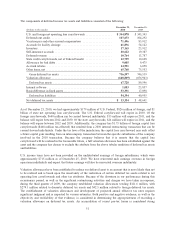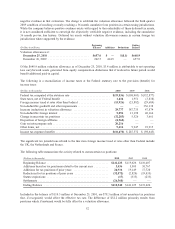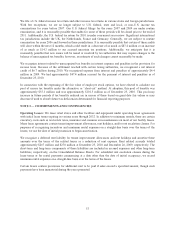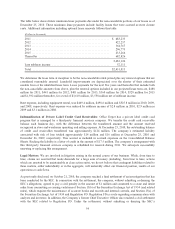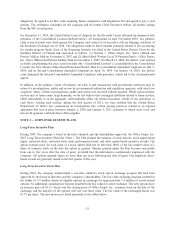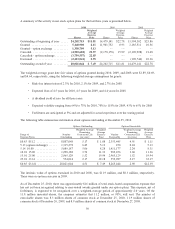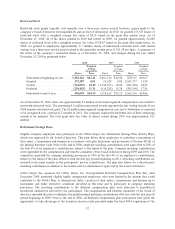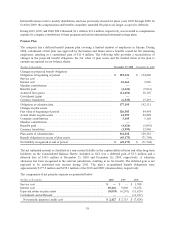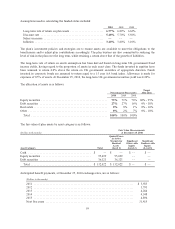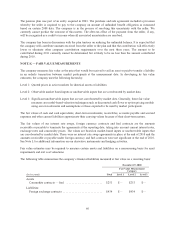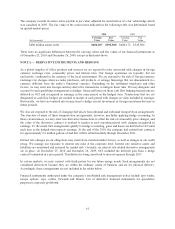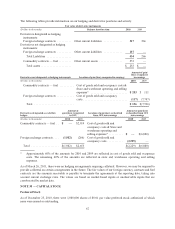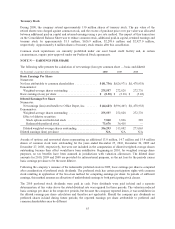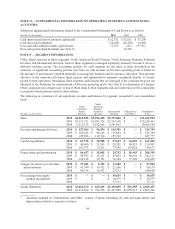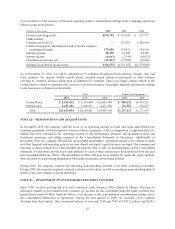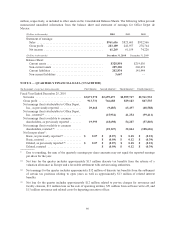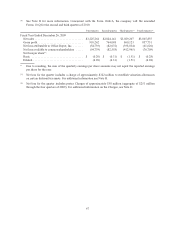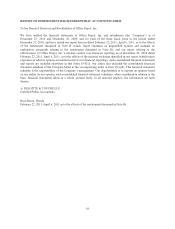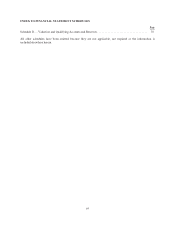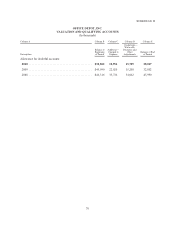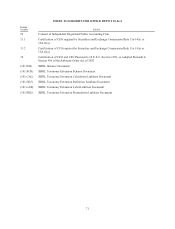Office Depot 2010 Annual Report Download - page 62
Download and view the complete annual report
Please find page 62 of the 2010 Office Depot annual report below. You can navigate through the pages in the report by either clicking on the pages listed below, or by using the keyword search tool below to find specific information within the annual report.
The company records its senior notes payable at par value, adjusted for amortization of a fair value hedge which
was cancelled in 2005. The fair value of the senior notes indicated in the following table was determined based
on quoted market prices.
2010 2009
(In thousands)
Carrying
Value
Fair
Value
Carrying
Value
Fair
Value
$400 million senior notes ................... $400,067 $398,000 $400,172 $345,966
There were no significant differences between the carrying values and fair values of our financial instruments as
of December 25, 2010 and December 26, 2009, except as disclosed above.
NOTE L — DERIVATIVE INSTRUMENTS AND HEDGING
As a global supplier of office products and services we are exposed to risks associated with changes in foreign
currency exchange rates, commodity prices and interest rates. Our foreign operations are typically, but not
exclusively, conducted in the currency of the local environment. We are exposed to the risk of foreign currency
exchange rate changes when we make purchases, sell products, or arrange financings that are denominated in a
currency different from the entity’s functional currency. Depending on the settlement timeframe and other
factors, we may enter into foreign currency derivative transactions to mitigate those risks. We may designate and
account for such qualifying arrangements as hedges. Gains and losses on these cash flow hedging transactions are
deferred in OCI and recognized in earnings in the same period as the hedged item. Transactions that are not
designated as cash flow hedges are marked to market at each period with changes in value included in earnings.
Historically, we have not entered into transactions to hedge our net investment in foreign operations but may in
future periods.
We also are exposed to the risk of changing fuel prices from inbound and outbound transportation arrangements.
The structure of many of these transportation arrangements, however, precludes applying hedge accounting. In
those circumstances, we may enter into derivative transactions to offset the risk of commodity price changes, and
the value of the derivative contract is marked to market at each reporting period with changes recognized in
earnings. To the extent fuel arrangements qualify for hedge accounting, gains and losses are deferred in OCI until
such time as the hedged item impacts earnings. At the end of the 2010, the company had entered into contracts
for approximately 9.6 million gallons of fuel that will be settled monthly through December 2011.
Interest rate changes on our obligations may result from external market factors, as well as changes in our credit
rating. We manage our exposure to interest rate risks at the corporate level. Interest rate sensitive assets and
liabilities are monitored and assessed for market risk. Currently, no interest rate related derivative arrangements
are in place. At December 25, 2010 and December 26, 2009, OCI included the deferred gain from a hedge
contract terminated in a prior period. This deferral is being amortized to interest expense through 2013.
In certain markets, we may contract with third parties for our future energy needs. Such arrangements are not
considered derivatives because they are within the ordinary course of business and are for physical delivery.
Accordingly, these arrangements are not included in the tables below.
Financial instruments authorized under the company’s established risk management policy include spot trades,
swaps, options, caps, collars, forwards and futures. Use of derivative financial instruments for speculative
purposes is expressly prohibited.
61


